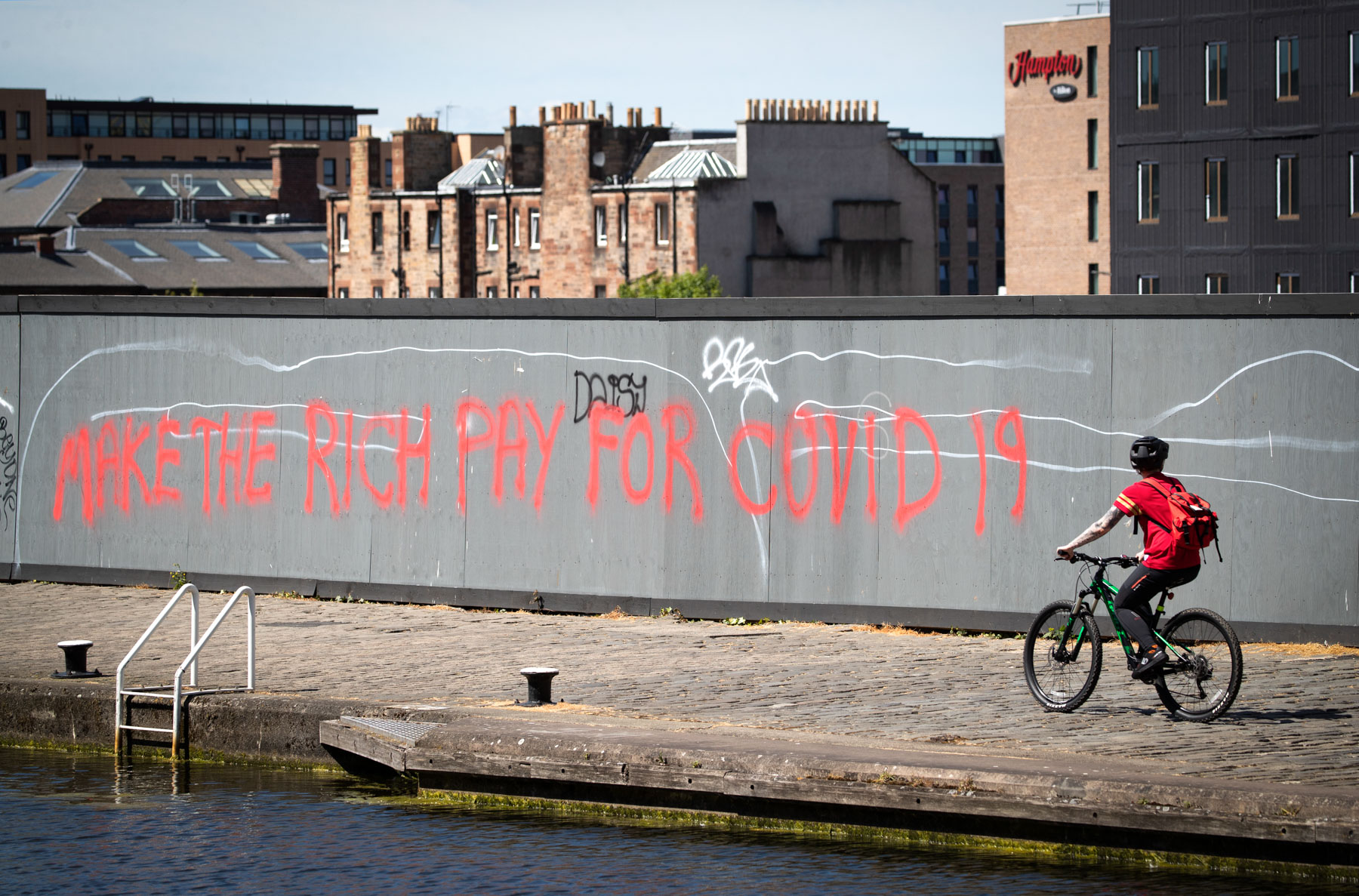What’s plan B? Capitalism hasn’t thought that far
Communism, as implemented by Stalin and Mao, didn’t deliver what it promised and Covid-19 has exposed hyper-globalised capitalism as fatally fragile. So, now what?
Author:
23 June 2020

Are you now or have you ever been a capitalist? Mouille Point resident Peter Wagenaar didn’t seem to get the joke of being asked that question, which he repeated back to himself, apparently puzzled: “Am I now or have I ever been a capitalist… ?”
So the original version didn’t resonate with him. “Are you now or have you ever been a communist?”, first uttered in 1947, was the malevolent mantra of the House Un-American Activities Committee in the United States.
The committee wasn’t in the vanguard of attacking communism as much as shielding capitalism from legitimate scrutiny in an era when the defeat of fascism by an alliance of communists and capitalists had given all pause for thought. Maybe those capitalists weren’t so selfish and greedy after all. Maybe those commies had some good ideas for a better life for all.
Nevertheless, the anti-communist poison was spread throughout the West. In the East, Stalin and Mao enforced a brutally bastardised version of communism. Now Russia is wild with the rampant excesses of capitalism. China has bent a structurally communist state to the will of a blatantly capitalist economy, which is slavishly embraced by the supposedly disapproving West.
But a formidable change agent has killed millions and closed down what we have had forced on us as the global economy. Covid-19 could cost the world $9 trillion (about R155 trillion) and 600 million people could be forced to live on less than $2 a day. That spirit of affluence itself, Rolls Royce, will shed 9 000 jobs.
Related article:
All that should be needed for capitalism to be declared dead is for it to fall over and stink. The pandemic has ripped the clothes off an emperor so arrogant they never thought their dominance would be threatened. Trapped in the terminal thrashings of a rapidly failing plan A and with no sight of a plan B, we’re all suffering, albeit some more than others. So, are you now or have you ever been…
“I guess I have been a capitalist in that I’ve pursued profits and gains at a certain cost,” Wagenaar said. “But this has made me think about things in a different light.”
What was “this”? Take your pick from the coronavirus and the resultant lockdown, South Africa’s overwhelming inequalities, Wagenaar and his wife Lesley’s efforts to alleviate the effects of the latter, which have been exacerbated by the former, or that in the early hours of 6 May, the Wagenaars’ car was petrol-bombed, apparently by people who took violent exception to their compassion.
A more just society wouldn’t tolerate the economic unfairness that seals South Africa’s middle class into their unreality. In a better country there would be fewer poor people – everywhere, not just on the street – and better support systems for the homeless and hungry. Then the Wagenaars wouldn’t stick out as members of a wealthy community feeding some of the poorest among us. And thus they wouldn’t have been woken by firelight dancing through the windows of their beachfront apartment as their car went up in flames across from the Cape Town promenade.
Forced into plan B
One theory was that the Wagenaars had pushed their property and business-owning neighbours, who vent about them alarmingly on poisonous social media platforms, too far. Another was that they had angered criminal gangs, whose bosses were none too pleased that their drug runners were less dependent because they were less hungry. Whoever, whatever.
Those apparently disparate elements are more alike than they would care to admit. They are both in the business of making money, of hoarding assets, of disregarding or breaking the law when it suits them. The Wagenaars’ neighbours and gangsters are capitalists, one and the same. Behave like a socialist on what they consider their turf and they will feel threatened.
It’s a neat scenario. Too neat. Wagenaar is an estate agent and a branding specialist. He is as capitalist as they come. But he and his wife spent eight weeks preparing and distributing more than 17 000 meals. How come they don’t behave as if all they believe in is profit (theirs) and loss (everybody else’s)?
Related article:
“Folks chase the money, and we all get on to the hamster wheel to varying degrees. Chase the big money and the big profits and the bigger dreams and bigger things,” Peter Wagenaar said. “But this is a unique situation. It’s like when someone loses their sight or their ability to do something. Then what is plan B?
“People have been like deer in the headlights. But it has thrown up some entrepreneurial ideas. People have thought, ‘Hold on, maybe I want to spend more time at home and do X and Y.’ And take up other business opportunities. There obviously aren’t that many, but the sharp guys have been thinking out the box.”
Once the virus has cleared, would he go back to his old life? “Both [real estate and branding] are in the line of people’s businesses and I enjoy them. But would I focus purely on them? No. I would want to do things on the humanitarian side as well and help folk who are in need.”
The burnt-out shell of the couple’s Mini is to be mounted atop a shipping container, which will house a café and a library “so the homeless guys can come and get a coffee and a book”.

No strings attached
Wagenaar’s branding expertise could be useful in Australia, where one of the horrors of Covid-19 has manifested itself in the shape of Madura, a leading tea label, downgrading to tagless tea bags. We know tagged bags are for the posh and tagless are for the rest of us. But Aussies like to pretend they believe in egalitarianism: “We should all bloody well enjoy the privilege of tagged bloody tea bags, mate. Dinkum.”
Thing is, the tags are made in Spain and the string that connects them to the bag is from Germany. With so many borders closed and those that are open clogged by the movement of more essential goods, there are suddenly no strings attached between Aussies and their tea bags.
Madura have put a notice into their packs: “Dear customer, with the current global upheaval we have been short supplied tags for our tea bags, a matter outside our control. We sincerely apologise for this inconvenience. As a short-term measure, we have affixed the tea bag string in a loop and have provided a tray divider that can be folded into a square tube that can be inserted through the string loop and used to support the tea bag across the top of your cup while brewing and withdrawing the tea bag.”
Dear Australians, join the civilised world and fish the tea bag out of your mug using an elegant, thoroughly modern, shockingly simple solution. It’s called a teaspoon.
Related article:
That small example tells us hyper-globalised capitalism isn’t what it’s cracked up to be. Business has chased, for so long and at any environmental, political, moral and human cost, the cheapest way of getting something done. Has capitalism brainwashed us so effectively we never thought more robust systems would be necessary? Or that alternatives might be a good idea?
That notion seemed to smack Tony Blair, the United Kingdom’s prime minister for 10 years and a key driver of global neoliberalism, upside the head.
“Government is going to have to change the way it works and change its relationship with the world of work,” Blair said in an interview with the state-owned British Broadcasting Corporation. “There will be people who are unemployed and there’s going to have to be a really deep and intense relationship between government and the business sector to work out the changes. There’s a risk that a part of the Left goes back to, ‘Now the state’s got to take charge.’ And there’s a risk that the Right retreats into economic nationalism and protectionism. Politics has got to catch up with the way the world’s changing.”
Related article:
For one certified financial planner who, despite anarchist leanings, works for a major financial services company that hides its wealth in the Channel Islands, it’s too late for that. “When the system becomes monopolised by interests it creates distortions, and that’s what’s happened. To see how well that’s being disguised from the average Joe, that hurts. I make a point of getting people to understand that it’s not that complex.
“But you do need to take away the camouflage for them to see that. You need to be careful how you do that because if you unveil too much, people who are your clients may start to think like you, and that could be a threat to the organisation that pays your salary. It is a fine line in terms of trying to make a difference in an industry that I do feel has been warped and distorted and is perhaps not fully serving the need. An architecture has been built, worldwide, that creates the wrong incentives and the wrong conflicts. It’s not totally bad and it’s not totally good, but it’s definitely broken.”
Once they were a capitalist. Now? They’re not so sure.




